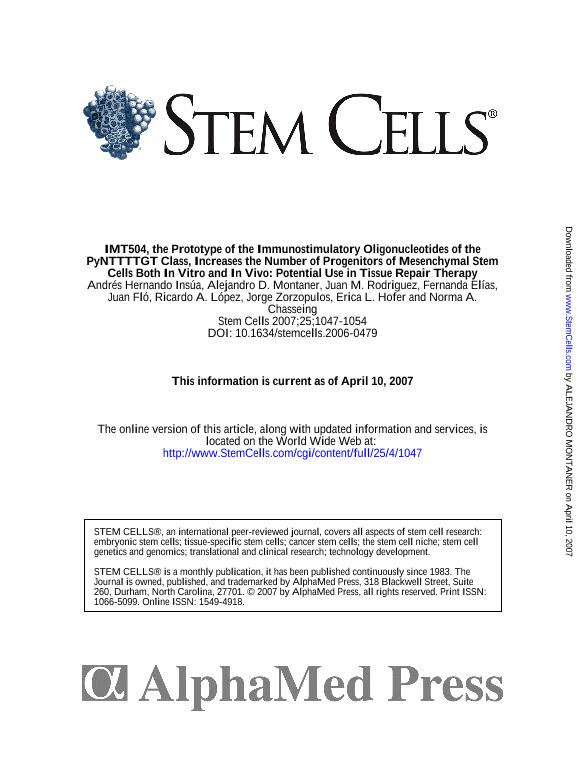Artículo
IMT504, the prototype of the immunostimulatory oligonucleotides of the PyNTTTTGT class, increases the number of progenitors of mesenchymal stem cells both in vitro and in vivo: potential use in tissue repair therapy
Hernando Insúa, Andrés; Montaner, Alejandro Daniel ; Rodriguez, Juan Manuel
; Rodriguez, Juan Manuel ; Elías, Fernanda; Fló, Juan; López, Ricardo A.; Zorzopulos, Ricardo A.; Hofer, Erica L.; Chasseing, Norma Alejandra
; Elías, Fernanda; Fló, Juan; López, Ricardo A.; Zorzopulos, Ricardo A.; Hofer, Erica L.; Chasseing, Norma Alejandra
 ; Rodriguez, Juan Manuel
; Rodriguez, Juan Manuel ; Elías, Fernanda; Fló, Juan; López, Ricardo A.; Zorzopulos, Ricardo A.; Hofer, Erica L.; Chasseing, Norma Alejandra
; Elías, Fernanda; Fló, Juan; López, Ricardo A.; Zorzopulos, Ricardo A.; Hofer, Erica L.; Chasseing, Norma Alejandra
Fecha de publicación:
25/04/2007
Editorial:
Alphamed Press
Revista:
Stem Cells
ISSN:
1066-5099
e-ISSN:
1549-4918
Idioma:
Inglés
Tipo de recurso:
Artículo publicado
Clasificación temática:
Resumen
Bone marrow (BM)-derived adult mesenchymal stem cells (MSCs) have the capacity to differentiate in vitro into different cell lines. This makes them a likely source for application in tissue repair therapies. Here, we report evidence indicating that, both in vivo and in vitro, IMT504, the prototype of the PyNTTTTGT class of immunostimulatory oligonucleotides, significantly increases the number of fibroblast colony-forming units (CFU-Fs) that originate MSCs. When rat BM cells were cultured with IMT504, the mean number of CFU-Fs increased about three times as compared with untreated controls (CFU-F: 19 +/- 6.3 vs. 6.8 +/- 2.0/2 x 10(6) seeded BM cells, p = .03). Furthermore, rats inoculated with IMT504 had a significantly higher number of CFU-Fs both in BM (CFU-F: 124 +/- 33 vs. 38 +/- 17/femur, p = .04) and in peripheral blood (animals with detectable CFU-Fs in circulation 8/12 vs. 2/12, p = .04) as compared with untreated animals. On the other hand, BM-derived adherent cells either treated in vitro with IMT504 or obtained from animals injected with IMT504 possess the capacity to differentiate to the osteogenic and adipogenic cell lineages as regular MSCs. Finally, we found that repair of a bone defect was accelerated in rats injected with IMT504 as compared with control animals (area with consolidated bone: 80% +/- 6.4% vs. 49% +/- 3.5%, p = .03, n = 10 rats per group). Importantly, when two human BM were cultured in the presence of IMT504, the mean number of fibroblastic adherent colonies also increased as compared with controls. These results suggest the possibility of clinical use of IMT504 in bone, and presumably other, tissue repair therapies.
Archivos asociados
Licencia
Identificadores
Colecciones
Articulos(IBYME)
Articulos de INST.DE BIOLOGIA Y MEDICINA EXPERIMENTAL (I)
Articulos de INST.DE BIOLOGIA Y MEDICINA EXPERIMENTAL (I)
Citación
Hernando Insúa, Andrés; Montaner, Alejandro Daniel; Rodriguez, Juan Manuel; Elías, Fernanda; Fló, Juan; et al.; IMT504, the prototype of the immunostimulatory oligonucleotides of the PyNTTTTGT class, increases the number of progenitors of mesenchymal stem cells both in vitro and in vivo: potential use in tissue repair therapy; Alphamed Press; Stem Cells; 25; 4; 25-4-2007; 1047-1054
Compartir
Altmétricas



